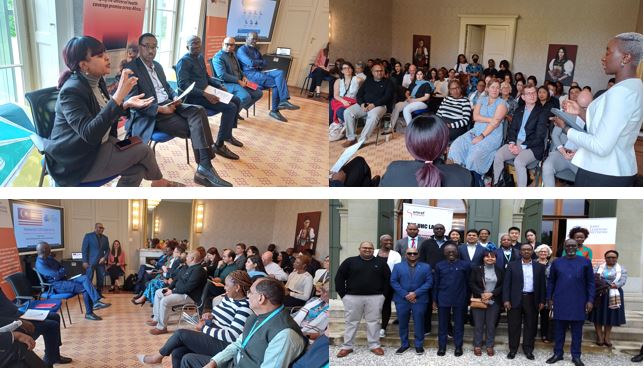JLN Showcase – Sidelines of 77 World Health Assembly, Geneva
 South-South Collaboration: Harnessing Cross-Country Learning for Sustainable Health Policy Reforms, 27th May 2024 at the International Geneva, Welcome Centre
South-South Collaboration: Harnessing Cross-Country Learning for Sustainable Health Policy Reforms, 27th May 2024 at the International Geneva, Welcome Centre
On May 27th, the Joint Learning Network (JLN) took centre stage at a special showcase held on the sidelines of the 77th World Health Assembly in Geneva. Jointly hosted by JLN, UHC Delivery Lab and Amref Health Africa, with the support of UHC2030, the session was a vibrant platform for sharing impactful stories and discussing future collaborations. The event, attended by over 75 participants in person and 24 virtually, brought together policymakers, representatives from civil society organizations, pharmaceutical companies, UHC advocacy organizations, WHO, the Global Fund, Cochrane, and other stakeholders.
The focus of the session was on the transformative impact of JLN in countries like Malaysia and Ghana. A representative from the Bill and Melinda Gates Foundation highlighted the critical value of investing in collaborative platforms like JLN. “South-South collaboration is a powerful tool for driving sustainable health reforms,” said Dr. Jean Kagubare, Deputy Director of PHC at the Bill and Melinda Gates Foundation. “Our investments show that cross-country learning not only accelerates innovation but also builds stronger, more resilient health systems. The real win is seeing these collaborations translate into tangible improvements in healthcare delivery and outcomes.”
Dr. Anthony Ofosu, Deputy Director General of the Ghana Health Service, shared his experience: “Being part of the Joint Learning Network has been transformative for Ghana’s health system. The cross-country collaboration and knowledge sharing have significantly strengthened our policies, driving us closer to achieving universal health coverage.”
Dr. Mercy Mwangangi, Senior Director of Health Systems Strengthening at Amref Health Africa, emphasized the importance of peer-to-peer learning facilitated by JLN, SPARC, and the UHC Lab. “Country pairing and coaching have been instrumental in fostering peer-to-peer learning, enabling countries to adopt best practices and tailor them to their unique contexts,” she noted. “Through our innovative learning platforms, we’ve seen firsthand how adaptive and participatory approaches can effectively address evolving health system challenges, driving sustainable reforms in LMICs.”
Dinash Aravind from Malaysia’s Ministry of Health also shared insights on JLN’s impact. “JLN has been pivotal for Malaysia’s health system transformation, enhancing our policies and driving progress towards universal health coverage.”
Dr. Ganda Gregory, County CEC, Health – Kisumu County noted that the Ethiopia-Kenya country pairing engagement facilitated by the UHC Delivery Lab had strengthened our Primary Care Networks, ensuring better health outcomes for our community through shared experiences and emerging lessons.
The session highlighted the power of South-South collaboration in building resilient health systems and accelerating innovation, ultimately contributing to sustainable health reforms and improved healthcare delivery in low- and middle-income countries.
